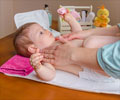Clinics devoted to baby care clinics in the UK are on the verge of collapse, claims a new study.
Babies needing special care after birth in the UK could be facing some bleak times ahead as the clinics meant to treat them are woefully understaffed and starved of funds.
So understaffed they are that they refuse new admissions and babies are often driven hundreds of miles to the nearest empty intensive care cot.Lack of funding has left units struggling more than ever to reach minimum staffing levels, according to the baby charity Bliss.
As a result, demand for care is outstripping supply and the safety of babies could be 'compromised.'
After a survey of 195 neonatal units across the UK, it was found units were forced to refuse new admissions for an average total of two weeks out of a six-month period.
In all, one in ten closed their doors to new admissions for eight weeks or more over six months.
The study also found that most units were operating above the 70 per cent average occupancy level recommended by experts.
Advertisement
Although some new nurses have been recruited, the service is still 2,600 nurses short of the recommended number, the study said.
Advertisement
In high dependency care, there should be at least one nurse to every two babies and, in special care, there should be at least one nurse to every four babies.
Previous research showed that if these targets were achieved, infant deaths could be reduced by 48 per cent.
Andy Cole, chief executive of Bliss, said "Bliss is concerned that the Government still gives less priority to intensive care for babies than for adults and children, even though all the evidence points to a neonatal service that is on the brink of collapse.
"The Department of Health's recent commitment to provide extra midwives is a step in the right direction for maternity services.
"We now need to see the same commitment to ensuring there are adequate numbers of trained neonatal nurses for those babies born sick or premature."
The study found the system was only being kept together by the goodwill of doctors and nurses working above their agreed unit capacity.
It also noted there was no consistent dedicated transport service for transferring babies to specialist units if the one near their home was full.
As many as 35 per cent of twins and triplets needing special care were separated and treated in different hospitals last year as a result, it said.
But the demand for emergency transfers is rising because of the increasing complexity of cases resulting from better survival of premature babies and multiple births, say researchers.
Health Minister Ann Keen said "We agree that it is important that neonatal units are staffed by trained, experienced nurses. "That is why we are increasing the numbers of nurses in neonatal care - the number of paediatric nurses increased by 3,293 - 21.5 per cent - between 1997 and September 2006.
"This growth is set to continue with the number of students doing children's nurse training increasing by 46.5 per cent, or 654 students, in the same period.
"We are currently examining the effectiveness of the existing networks, the availability of cots and the workforce issues that BLISS raise."
Source-Medindia
GPL /B








